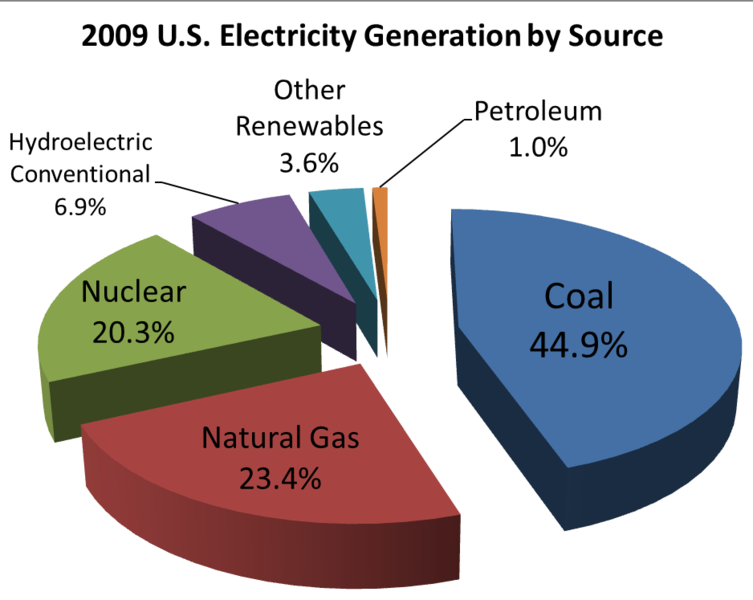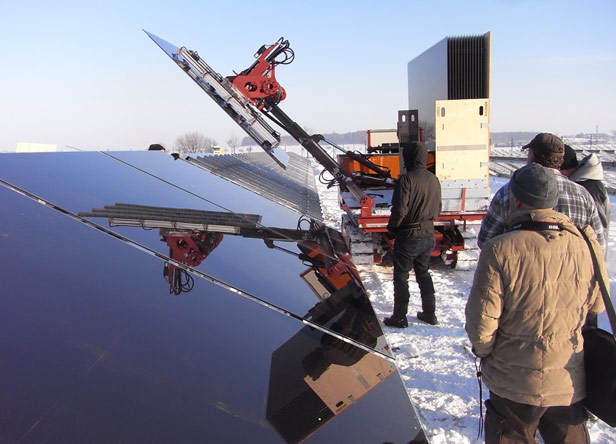When we flick on the lights, turn on the AC, or charge our phone,
we don’t usually think about where the electricity comes from. It might be a
surprise to some that nearly 45% of comes from coal, followed by natural gas
and then nuclear. But with global
warming effects increasing, and a slow growing economy, we have to ask: Is there a
cheaper, cleaner solution?
 |
| Energy Sources in 2009. Image Credit: Solarenergyfactsblog.com |
Most people know about the renewables: wind, hydro, and
solar. And while we all want to be friendly to the environment, coal is usually used instead because it's cheaper. Or is it? Due to advancing technology, solar is surpassing coal in price performance.
Let me say that again, solar is cheaper than coal. And the best part? It’s getting even cheaper. This is why New Mexico, Texas, and India are all going solar. And finally, this is why the world's biggest coal company is now switching to solar.
Let me say that again, solar is cheaper than coal. And the best part? It’s getting even cheaper. This is why New Mexico, Texas, and India are all going solar. And finally, this is why the world's biggest coal company is now switching to solar.
We need to backtrack a little bit to understand how technology can do this. For
the longest time, we used fossil fuels for power plants because of the extraordinary amount of energy stored in chemical bonds between carbon atoms.
But the problem now is that we are reaching the peak of our coal supply. Even if all fossil fuels were clean, we simply would not be able to sustain our economy with them because they are running out. Lower supply leads to higher pricing.
Solar on the other hand is seemingly limitless. The world right now receives over 20,000 times the power from the sun than we produce with our power plants. The difficulty has not been the supply, but rather the collection process.
But the problem now is that we are reaching the peak of our coal supply. Even if all fossil fuels were clean, we simply would not be able to sustain our economy with them because they are running out. Lower supply leads to higher pricing.
Solar on the other hand is seemingly limitless. The world right now receives over 20,000 times the power from the sun than we produce with our power plants. The difficulty has not been the supply, but rather the collection process.
 |
| Solar Panels being installed by robots to reduce installation costs. Image Credit: Kurzweilai.com & Gehrlicher Solar AG |
Solar panels use transistors to collect energy. Transistors are switches that are used in computer chips, and as a result, the computer industry has been intensively innovating methods to shrink them and lower their cost. This is why the cost of solar has dropped so quickly and it is also why it will continue to do so.
If you look at this trend, the cost of clean solar is projected to be 10 times cheaper than coal in 2021. By 2031, it will be 100 times. Imagine your electric bill going from $70 to $0.70. This powerful solar technology will surely brighten our future world.
 |
| Cost of Solar dramatically decreasing. Image Credit: Granitegrok.com |
© Nicholas Shah and Learning More Than Living, 2013. Please note that the material included this was not written by a licensed medical professional. Therefore, please consult your physician before trying anything suggested in this article. Please note that there were several images in this article. The first as from solarenergyfactsblog.com. The second was from Kurzweilai.com & Gehrlicher Solar Ag. The third was from granitegrok.com. This blog does not claim ownership of these images. Nicholas Shah does not claim ownership to the ideas put forth here. However, he does claim ownership to the writing and authorship of the learningmorethanliving blog. Unauthorized use and/or duplication of this material without express and written permission from this blog’s author and/or owner is strictly prohibited. Excerpts and links may be used, provided that full and clear credit is given to Nicholas Shah and Learning More Than Living with appropriate and specific direction to the original content. Thank You.
Some energetic points...
ReplyDelete1. When we get fusion working it will be able to beat solar energy in terms of cost.
2. That chart actually came from the US Energy Information Administration. You shouldn't give credit to those who plagiarize.
3. If you look at the 2012 and 2013 data http://www.eia.gov/electricity/monthly/epm_table_grapher.cfm?t=epmt_es1a solar has quite a bit of catching up to do still with coal and even wind. 131,032 and 15,638 vs 619 megawatthours
4. The photovoltaic cell works by a semiconductor to separate charge after excitation via light. While transistors are also semiconductors the advances in solar can be more readily attributed to developments in the building of solar cells and using more efficient materials.
5. Start-up costs will still be an issue building or converting power plants. If solar is to overtake coal there will also have to be a place for all those solar panels.
-ARGotI